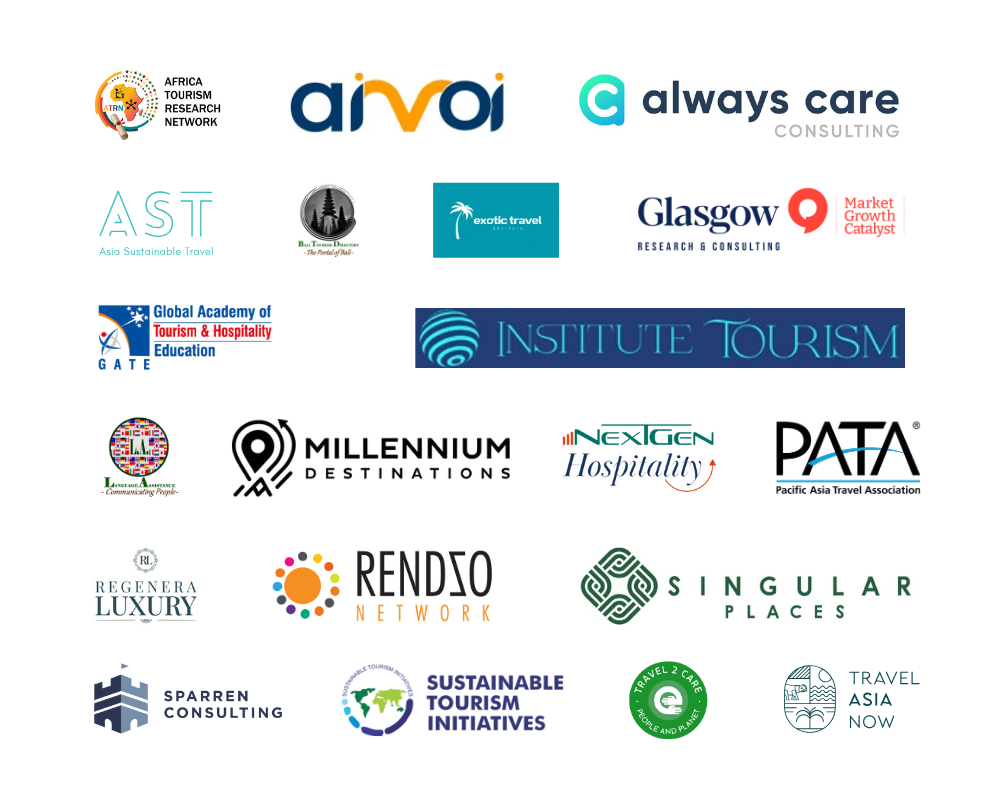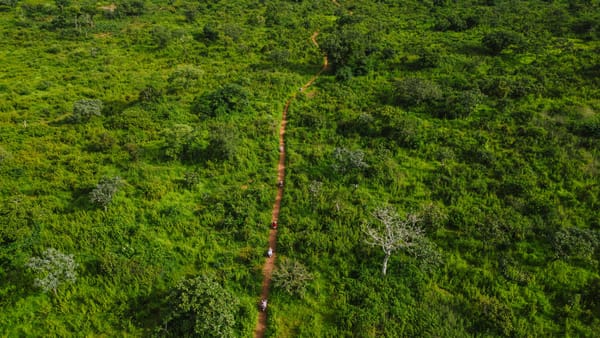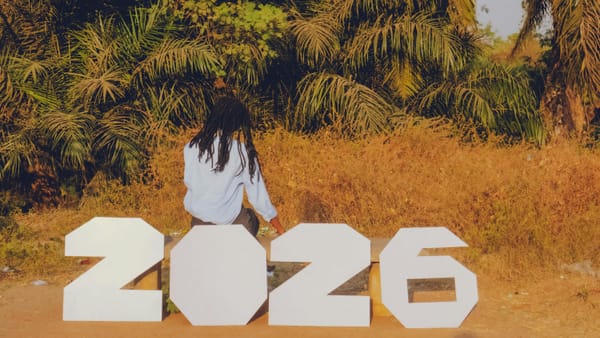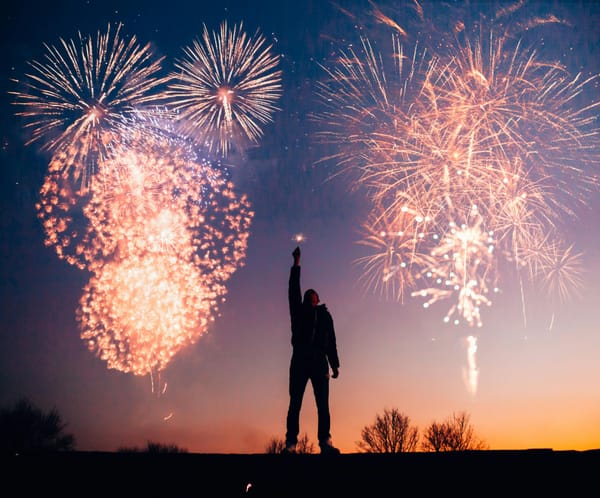Meaningful Tourism celebrates the Nobel Prize for Creative Destruction


Dear reader,
“Schumpeter” is the name of the business column in The Economist for a good reason. The Meaningful Tourism paradigm recognizes the key concept of Creative Destruction, which Joseph Schumpeter developed back in 1942, as one of the foundations of a holistic concept for the future sustainable development of tourism.
It was therefore a great joy when your humble editor and the whole Meaningful Tourism community received the news that the Nobel Prize for Economics 2025 was awarded to two scientists who have further developed the more than 80-year-old concept of Creative Destruction as the main driver for innovation and sustainability.
Joseph Alois Schumpeter (1883–1950) was a Moravian-born Austrian-American economist and political scientist, widely regarded as one of the most influential economists of the 20th century. Born to German-speaking parents, he grew up in Vienna, where he got his PhD in law and economics in 1906. From 1932 until his death in 1950, he taught in Harvard. His career also included a brief stint as Austria's Finance Minister in 1919, private banking roles, and visiting professorships at Columbia and Tokyo.
Schumpeter's key contributions include his theories on economic development, business cycles, and the evolution of capitalism. Most importantly, he popularized the concept of "creative destruction," where innovation continuously destroys old economic structures to create new ones, driving growth but also instability as discussed in a chapter of his most famous work, “Capitalism, Socialism and Democracy”. Chapter VII, discussing the Creative Destruction concept, is only seven pages long (pages 80-86) and your humble editor would highly recommend reading it.
Earlier this week, the Royal Swedish Academy of Sciences awarded the 2025 Nobel Prize in Economics to Joel Mokyr, Philippe Aghion, and Peter Howitt. Aghion and Howitt, who shared half of the prize and are based in Paris and London, have shown that sustained growth is based on Creative Destruction.

Joseph Schumpeter was the most respected economist in his time. However, he could not get the Nobel Prize for Economics for the simple reason that it did not yet exist. He died in 1950, while the Sveriges Riksbank Prize in Economic Sciences in Memory of Alfred Nobel, commonly, if incorrectly, known as the Nobel Prize for Economics, was started only in 1969.
The work of Aghion and Hewitt points out how the new technology and other developments, including climate change, will destroy jobs. Based on their work, the conclusion is clear: We need to protect workers but not the jobs. Their results also caution that economic growth cannot be taken for granted. There are many countries and companies that were ahead at one time but have fallen behind today. The mechanisms of creative destruction work both ways. If addressed positively, it unleashes growth; if ignored, it leashes misery too.
The Snow Cannon, wasting resources of water and energy and destroying the environment to create narrow downhill paths of artificial snow to extend the inevitable end of skiing in lower altitudes for a few years, can be seen as a symbol of the opposite of Creative Destruction. Instead of investing in new usages of the existing infrastructure in the mountains, billions of Euros and USD are burned in an uphill battle (excuse the pun) against climate change, which cannot be won.
Two weeks ago, your humble editor wrote here, discussing the results of the WTTC summit in Rome: “Therefore, it comes as no surprise that the big players in tourism and hospitality, members of WTTC, are way behind other industries in accepting the need for Creative Destruction in the sense of Schumpeter (if you do not know him, time to look him up) and in starting on the journey of transformation towards new business models.”
How wonderful that Joe Schumpeter’s work has been recognised now on the highest level.
The tourism industry of today is facing the urgent necessity to develop a Meaningful Tourism Economy based on Creative Destruction, embracing change rather than trying to keep the outdated business models going for just a little longer.
As always, all best wishes from Prof. Dr. Wolfgang Georg Arlt, a.k.a. “Prof M”, and the whole team in Kathmandu and Manila.


Discount for Meaningful Tourism Weekly readers for Dubai conference

Prof M, your humble editor, will be one of the keynote speakers during the Sustainable Destinations Forum (SDF) 2025, organised by our friends from Green Destinations and the Dubai Tourism Authority.
The keynote will be on October 28, discussing – no surprise – Meaningful Tourism.
The next day, “Good Travel Experiences” is the topic of a workshop on October 29. Dr. Ali Akaak, Certified Trainer for Oman and Prof M will be in the workshop to discuss the Good Travel Experience concept and the Meaningful Tourism paradigm together with Fivos Tsaravopoulos (Greece) and moderators Jana Apih, Executive Director of Green Destinations Foundation, and Iyad Kayali, Regional Director of Green Destinations. More details can be found in the Events section.
By using the code GD2025PARTNERS when booking your ticket, the Meaningful Tourism Centre can provide a 25% discount for the participation fee, saving 40 USD, for all readers of the Meaningful Tourism Weekly!
Cooperation with DIU in Bangladesh

The Daffodil International University (DIU), one of the best universities in Bangladesh, is planning to become a major hub in South Asia for the Meaningful Tourism community.
A basic agreement has been reached for a five-year plan of cooperation involving conferences, research, and academic programs. Stay tuned for more details coming soon!
Meaningful Tourism Award 2025
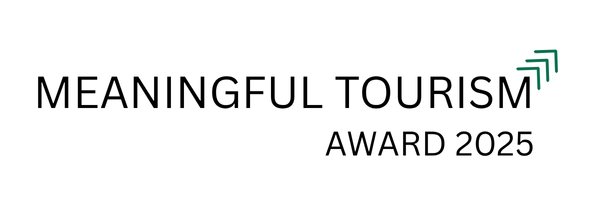
Last week, MTC started the Meaningful Tourism Award 2025.
Please consider to nominate a project, program, company, or organisation which is providing especially beneficial and satisfying services for travellers, host communities, employees of service providers, service providing companies, governments at different levels, or the environment.
For each stakeholder category, Gold, Silver, and Bronze Awards will be selected. Please do not hesitate, as nominations can be provided only until the 22nd of November, 2025.

First Tipping Point officially reached
The world faces a “new reality” as we have reached the first of many Earth system tipping points that will cause catastrophic harm unless humanity takes urgent action, according to a landmark report released on October 13, 2025, by the University of Exeter.
The Global Tipping Points Report finds that warm-water coral reefs – on which nearly a billion people and a quarter of all marine life depend – are passing their tipping point. Widespread dieback is taking place and – unless global warming is reversed – extensive reefs as we know them will be lost, although small refuges may survive and must be protected.
We are on the brink of more tipping points, with devastating risks for people and nature: the irreversible melting of polar ice sheets, the collapse of key ocean currents and the dieback of the Amazon rainforest.
One of the most alarming of these is the potential collapse of the Atlantic Meridional Overturning Circulation, a crucial network of ocean currents known as the AMOC. This would have catastrophic global consequences, pushing parts of the world into a deep freeze, heating up others, disrupting monsoon seasons and raising sea levels. According to the report, there is now a risk that collapse could occur within the lifetime of people born and living on the planet today.
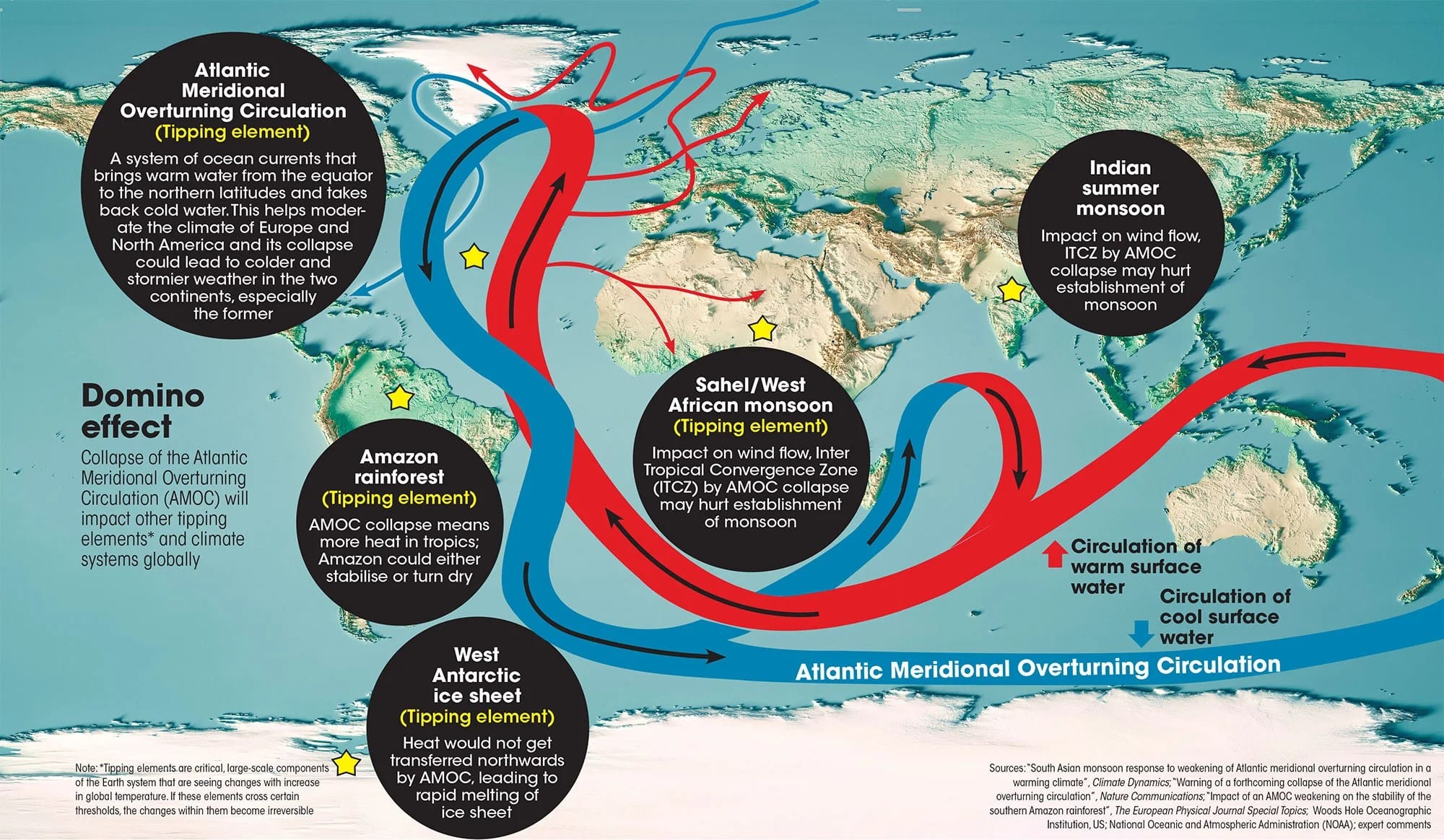

In Search of Higher Purpose
Part V: From Rearguard Action to Vanguard Vision
This is the fifth part of a five-part series of articles written by our Certified Trainer for Switzerland, Max Haberstroh, using Johann Wolfgang von Goethe's famous theatre play, Faust, to discuss the development and future of tourism, including the darker side of the success story.
If you missed the first part, you can check it out here. The second part is available here, the third part here, and the fourth part here.
Part V (of V) shows possible ways out to elevate the public framework of Travel & Tourism to a purpose higher than promoting its immediate travel and holiday business: toward a 'cluster' of multi-level communication tools, in order to act as the very ‘trailblazer’ for the True, the Beautiful, the Good. There is a good chance that Tourism will fail, but there is bad luck, if pusillanimity prevails.
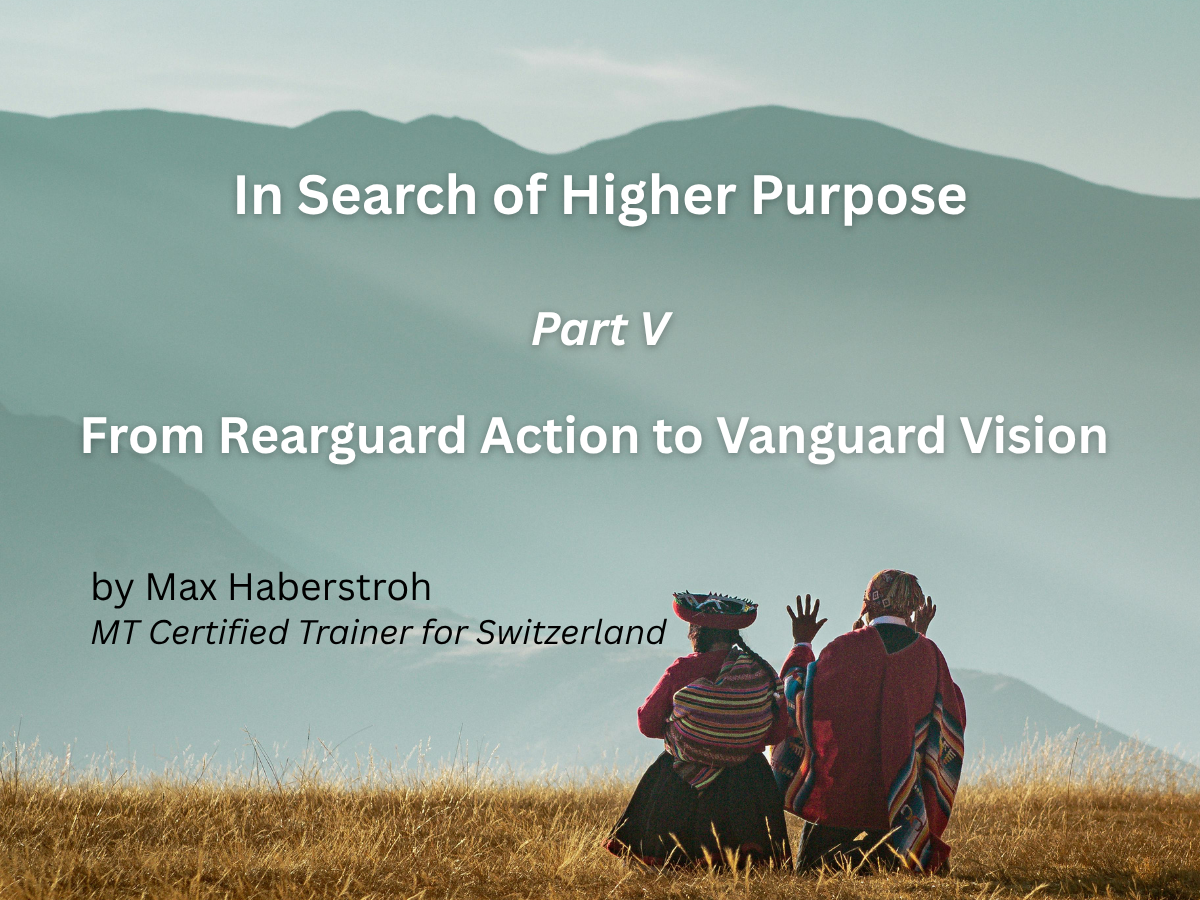
Foremost Promoters of Cultural Heritage and Values
Usually, we try to extrapolate past experiences to projections of the future. The results are determined by lag indicators. These are outcomes of actions previously taken – or not taken. However, in order to reach a healthy growth, we also need new performance drivers – new ideas, options, and links, which may turn out complementary to one another.
Great economic changes have occurred when new communication regimes converge with new energy regimes. We witness today the quick advance of e-communication, cybernetics, Artificial Intelligence and robotics, successful attempts of autonomous traffic, and the accelerated introduction of Renewable Energy.
There is an urgency to act: Natural disasters and the dramatic consequences of questionable human behaviour are a constant challenge to our modern civilization. Fossil energy calamities have become rampant, and nuclear energy, although often reclaimed as an indispensable interim solution to fuel energy-intensive industries, has lost its ambiguous innocence since Chernobyl and Fukushima, at the latest.
We somehow might have gotten used to politicians' lip services all over the past decades: We got used to shaking social foundations, and our alarm clock has stood still for long, showing past twelve. Are we impressed? It seems that in our world of ailing democracies, consumerism and enlightened humanism, the energy necessary to change things is just enough to slow down entropy. What a pity! – Why are there still all those hair-raising scandals about polluted air, land and sea, spoiled cities and landscapes, plastic waste scattered along mountain ranges, river sides and sea grounds? Why so much corruption and trickery at all levels of society? Why that disturbing indifference toward our common responsibility?

Meaningful Tourism Community: The Meaningful Tourism Transformational Game Workshop Trainer
Dr. Eyong Ayuk Ako-Ebot, Trainer for Cameroon

Dr. Eyong Ayuk Ako-Ebot is a tourism lecturer, researcher, and consultant specializing in sustainable and transformative tourism development. He holds a PhD in Management Studies (Tourism) from the University of South Africa, where his research focused on service quality frameworks for inbound tour operators in Cameroon. Dr. Eyong currently serves as a Lecturer at the University of Bertoua and teaches part-time at the University of Yaoundé I and the Baptist Higher Institute of Professional Studies.
His expertise covers areas such as tourism policy and planning, community and regenerative tourism, destination management, and the integration of ICT in tourism growth.
The Meaningful Tourism Weekly asked Dr. Eyong: What is the current situation of tourism in South Korea and how can the Meaningful Tourism Paradigm help to support its development?
His answer:
Cameroon also known in the tourism jargon as “All Africa in one country” is a tourism haven in Africa. Within its four tourism cultural zones (Grassfield; Sawa; Fang Beti and Savannah), you will certainly have an authentic experience of Water life along the coastal line of kribi and Limbe or hike up the second tallest mountain (Mt. Cameroon) after Mt. Kilimanjaro in Africa or eat the exotic traditional meals of Cameroonian gastronomy or the cultural dances that feeds the human spirit.
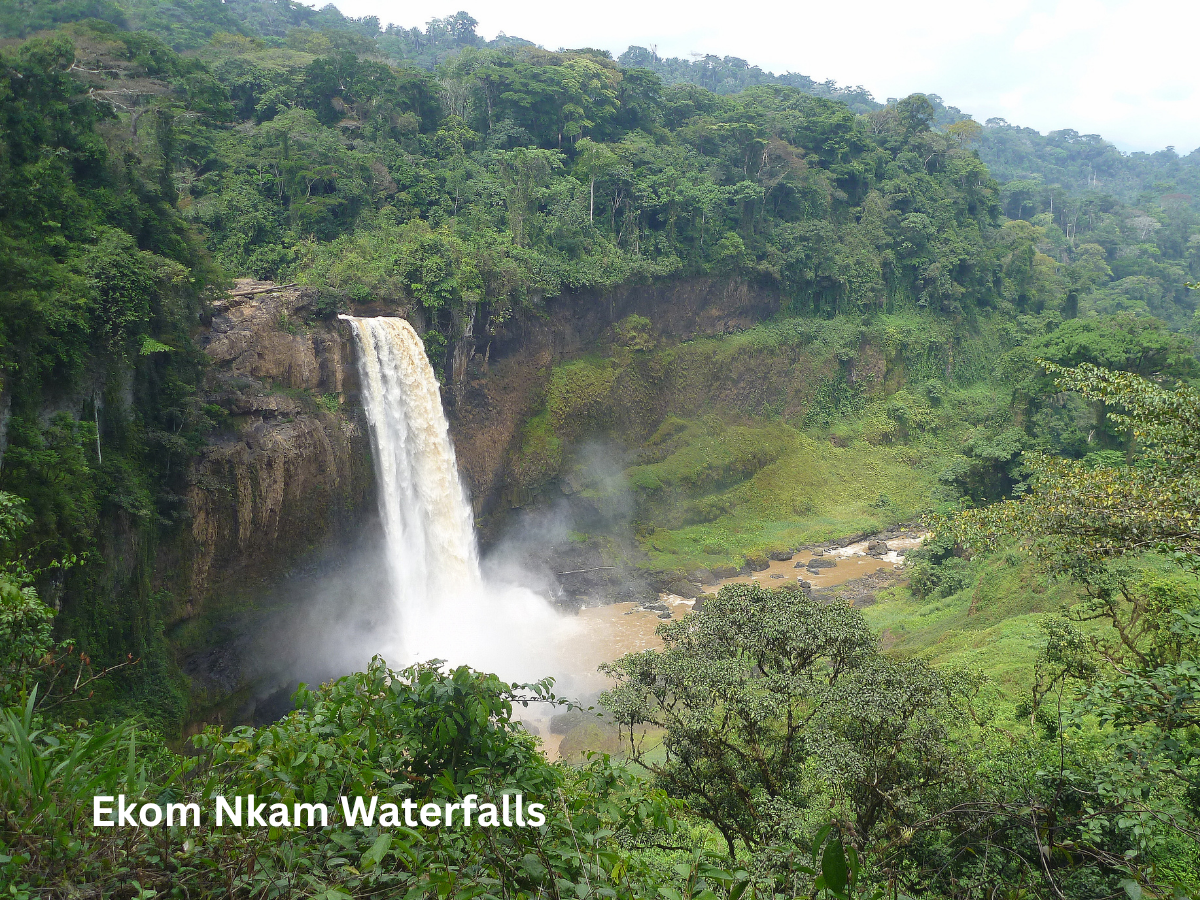
With a land surface area of about 4.56 hectares, tourists will discover very deep traditional and cultural values. Its eco touristic potentials spanning from forests, water bodies, sacred places, traditional chiefdoms, waterfalls and many more leave tourists wanting for more. Accessibility into the country is through its international airports that is Yaoundé Nsimalen and Douala International airports.
Cameroon is a true melting pot of breath-taking touristic opportunities, offering its visitors safari, hiking, trekking, striking flora and fauna as well its picturesque landscape. Despite this huge potential amidst a not too good business climate, the Cameroon government is doing its best to raise the international figures of tourists visiting the country. Investment opportunities await those who are patient and daring.
With a holistic view of the vision of Meaningful tourism paradigm, Cameroon tourism can better harness its potential to reach and why not exceed 3.5 million tourists visiting its land. With the understanding that all six stakeholders in the industry can make reasonable gains and good business, the industry needs a complete overhaul in its mindset from its present state. Join us in this change action of applying the Meaningful tourism model and lets maximize Cameroon’s touristic potential and build to higher heights Cameroon Tourism.
MTC Certified Trainers
Please find below the updated overview of all our Certified Trainers for the Meaningful Tourism Transformational Game Workshop, as well as the updated World Map showing the countries directly and indirectly covered at present.
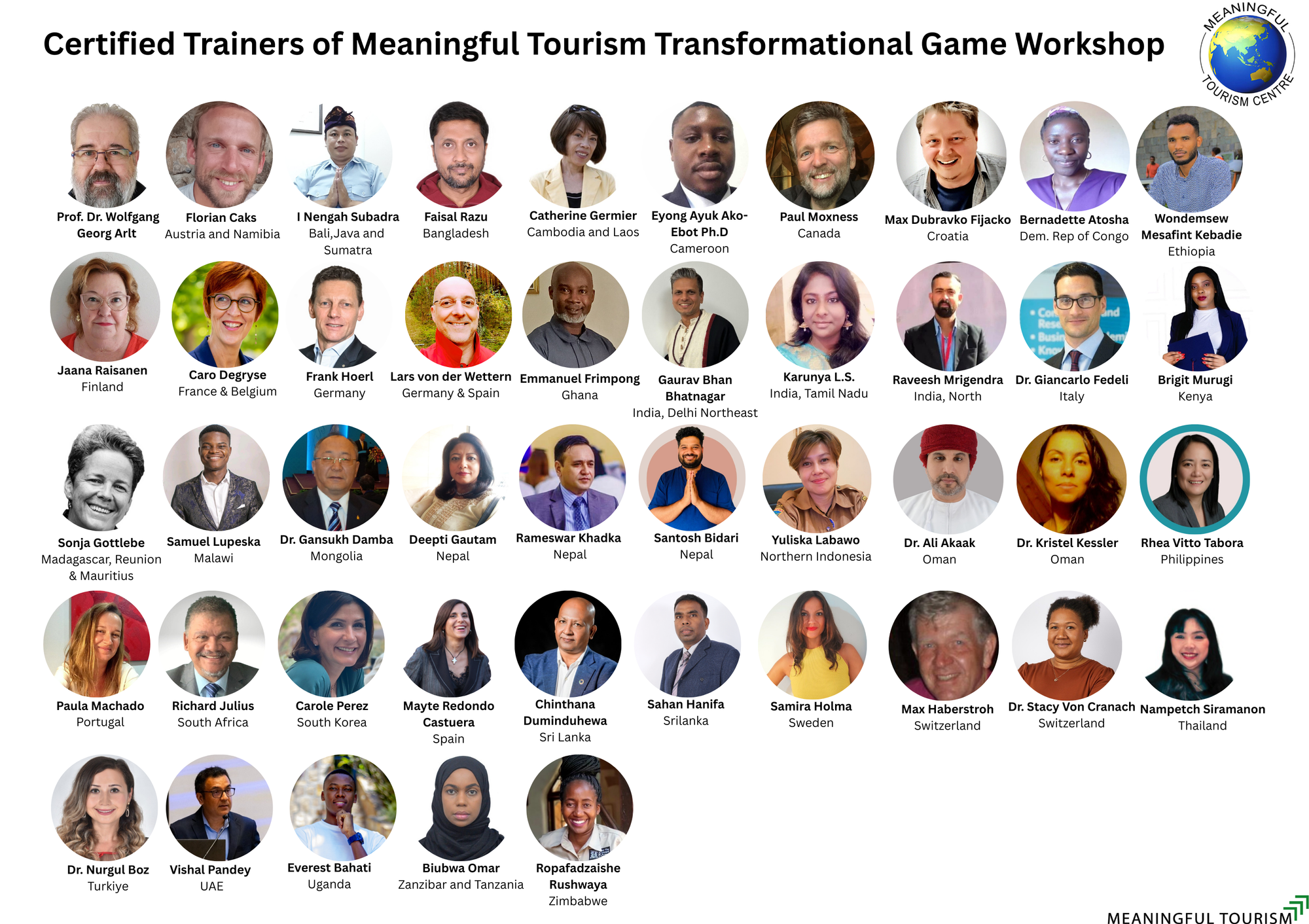
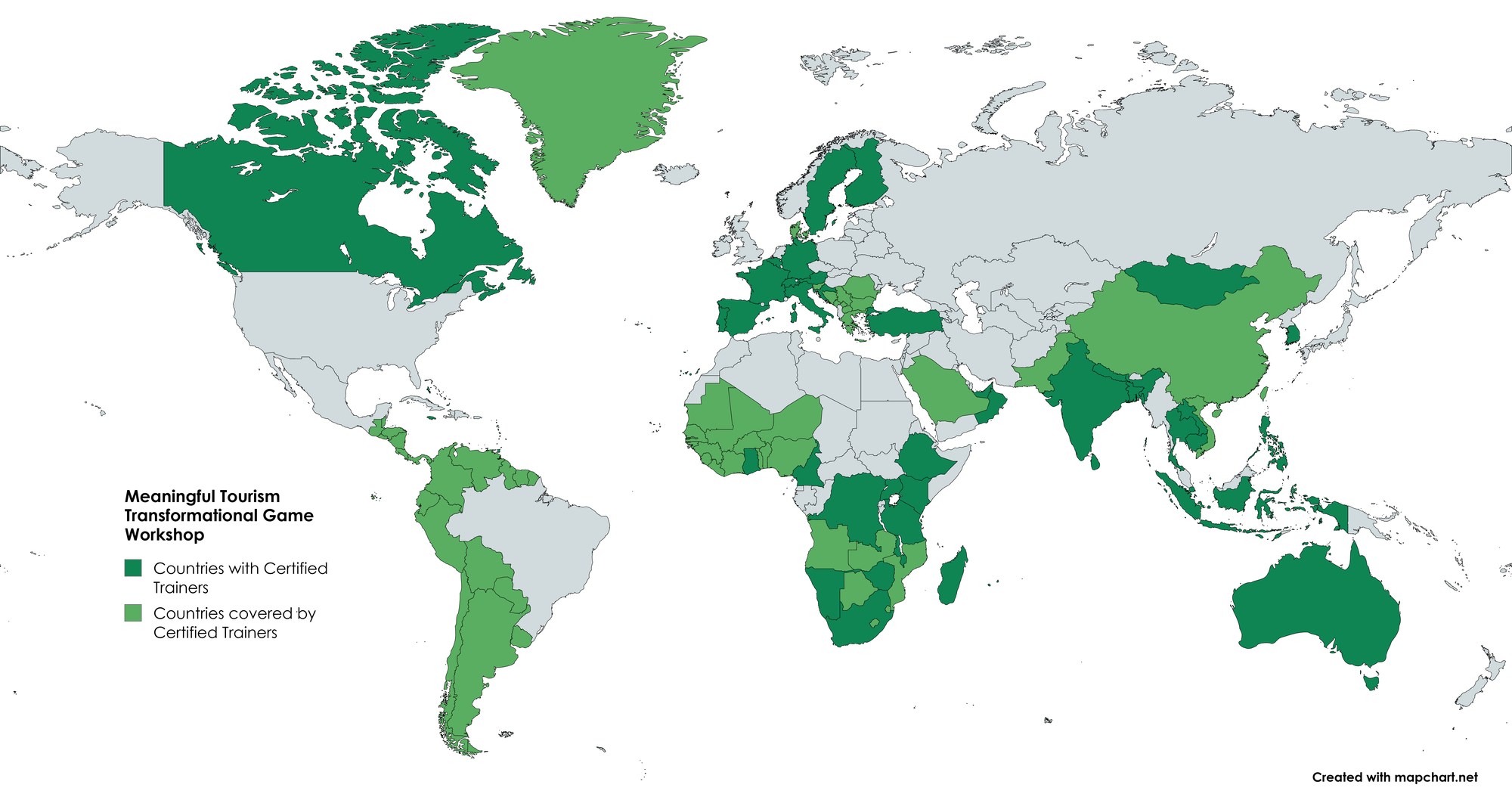
With almost 50 Certified Trainers, many countries and regions of the world are already covered. However, MTC continues to look for professionals with experience in training or lecturing and a passion for sustainable tourism.
If you are interested in becoming a Certified Trainer for the Meaningful Tourism Transformational Game Workshop for a country not marked in dark green on the map above, please contact us at office@meaningfultourismcentre.org.

Environmental Stewardship
Small actions can have a big effect.
Prakriti Resort and Organic Farm is situated in the Shivapuri Nagarjun National Park north of Kathmandu/Nepal on 2,100 m height. The organisation offers 22 rooms in small houses build in the regional Gurung style with local materials. Most of the employees are from the Gurung community.
The farm also has extensive fields using ecological farming and circular economy methods, providing seeds of successfully adapted plants to the surrounding farmers.
Meaningful Tourism Weekly recently portraited the project.
One little example of a Best Practice Example which is easy to copy around the world is the following:
Guests of Prakriti Farm are encouraged to use their walks along the many hiking routes in the area to execute their Environmental Stewardship by collecting trash on the way, from empty plastic bottles to chips wrappers and discarded plastic bags.
As a little incentive, guests who take up the suggestion are receiving a special Certificate of Environmental Stewardship.


Sustainable Destinations Forum 2025 in Expo City Dubai

Prof. Dr. Wolfgang Georg Arlt and Dr. Ali Akaak (Meaningful Tourism Trainer for Oman) will speak at the Sustainable Destinations Forum (SDF) 2025 Day 2 Workshop Session 5 titled "Adding a Good Travel Experience as a Premium Value to the Marketplace."
The workshop will be moderated by Jana Apih, Executive Director of Green Destinations Foundation, and Iyad Kayali, Regional Director of Green Destinations.
The full workshop agenda is available here.
The ticket is priced at 160 Euros and includes full access to the Forum Days:
October 28: Access to the forum, lunch, awards ceremony, and special heritage desert dinner
October 29: Workshop access and lunch
Green Destinations is offering all readers of Meaningful Tourism Weekly a special 25% discount on the participation fee.
For booking, please contact us at info@meaningfultourismcentre.org.
About Meaningful Tourism Weekly
Meaningful Tourism Weekly is published every Thursday by Meaningful Tourism Centre (MTC) - London and Kathmandu in collaboration with Travel Asia Now, led by Rhea Vitto Tabora. This partnership enhances the newsletter’s professional production and distribution, bringing added value to our readers.
Each issue features Editorial, updates on MTC activities, a Best Practice Example, a profile of an MTC-certified trainer, news about upcoming events, and occasionally additional op-ed pieces from guest authors. Carefully selected news items, including videos and podcasts, are also included, with links to their original sources in the Meaningful Tourism News section.
Subscription to Meaningful Tourism Weekly is free, with the addition of a paid content section that includes a library of surveys, exclusive articles, conference presentations, and statistical data, offering subscribers invaluable resources.
Sponsorship opportunities are available for those interested in supporting this initiative.
For more information about MTC's training programs, market research, product adaptation, consulting services, conferences, strategy development, and marketing, visit our website or email us at info@meaningfultourismcentre.org.

